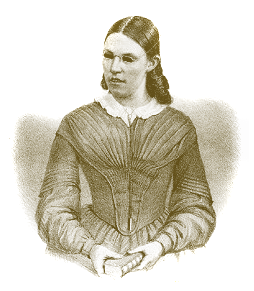 |
| Fanny Crosby. |
Known as the "Queen of Gospel Song Writers", and as the "Mother of modern congregational singing in America", with most American hymnals containing her work, as "with the possible exception of Isaac Watts and Charles Wesley, Crosby has generally been represented by the largest number of hymns of any writer of the twentieth century in nonliturgical hymnals". Her gospel songs were "paradigmatic of all revival music", and Ira Sankey attributed the success of the Moody and Sankey evangelical campaigns largely to Crosby's hymns. Some of Crosby's best-known songs include "Pass Me Not, O Gentle Saviour", "Blessed Assurance", "Jesus Is Tenderly Calling You Home", "Praise Him, Praise Him", "Rescue the Perishing", and "To God Be the Glory". Because some publishers were hesitant to have so many hymns by one person in their hymnals, Crosby used nearly 200 different pseudonyms during her career.
Crosby wrote over 1,000 secular poems, and had four books of poetry published, as well as two best-selling autobiographies. Additionally, she co-wrote popular secular songs, as well as political and patriotic songs, and at least five cantatas on biblical and patriotic themes, including The Flower Queen, the first secular cantata by an American composer. Crosby was committed to Christian rescue missions, and was known for her public speaking.
The hymn, "All The Way My Savior Leads Me" was first published in Brightest and best : a choice collection of new songs, duets, choruses, invocation and benediction hymns for the Sunday school and meetings of prayer and praise (edited by Dr. Lowry and W. Howard Doane) in 1875 by the New York publisher Biglow & Main. The syllabic meter is 8.7.8.7.D. This hymn came to Fanny as a result of a prayer. Struggling financially, she desperately needed some money. As her usual custom, Fanny began to pray. A few minutes later, a gentleman offered her five dollars, the exact amount she needed. Later recalling the incident, she said, “I have no way of accounting for this except to believe that God put it into the heart of this good man to bring the money.” The poem she wrote afterward became “All The Way My Savior Leads Me – Aldrin Lapitan.
vs.1
All the way my Savior leads me;
What have I to ask beside?
Can I doubt His tender mercy,
Who through life has been my Guide?
Heav’nly peace, divinest comfort,
Here by faith in Him to dwell!
For I know, whate’er befall me,
Jesus doeth all things well;
For I know, whate’er befall me,
Jesus doeth all things well.
vs.2
All the way my Savior leads me,
Cheers each winding path I tread;
Gives me grace for every trial,
Feeds me with the living Bread.
Though my weary steps may falter,
And my soul athirst may be,
Gushing from the Rock before me,
Lo! A spring of joy I see;
Gushing from the Rock before me,
Lo! A spring of joy I see.
vs.3
All the way my Savior leads me
O the fullness of His love!
Perfect rest to me is promised
In my Father’s house above.
When my spirit, clothed immortal,
Wings its flight to realms of day
This my song through endless ages—
Jesus led me all the way;
This my song through endless ages—
Jesus led me all the way.
All the way my Savior leads me;
What have I to ask beside?
Can I doubt His tender mercy,
Who through life has been my Guide?
Heav’nly peace, divinest comfort,
Here by faith in Him to dwell!
For I know, whate’er befall me,
Jesus doeth all things well;
For I know, whate’er befall me,
Jesus doeth all things well.
vs.2
All the way my Savior leads me,
Cheers each winding path I tread;
Gives me grace for every trial,
Feeds me with the living Bread.
Though my weary steps may falter,
And my soul athirst may be,
Gushing from the Rock before me,
Lo! A spring of joy I see;
Gushing from the Rock before me,
Lo! A spring of joy I see.
vs.3
All the way my Savior leads me
O the fullness of His love!
Perfect rest to me is promised
In my Father’s house above.
When my spirit, clothed immortal,
Wings its flight to realms of day
This my song through endless ages—
Jesus led me all the way;
This my song through endless ages—
Jesus led me all the way.
Rich Mullin’s version of “All the Way My Savior Leads Me.”
More Links To “All the Way My Savior Leads Me.”
- Chris Tomlin sings “All The Way My Savior Leads Me.”
- “All The Way My Savior Leads Me,” by a youth choir
- Children sing “All the Way My Savior Leads Me,” in a musical version of Fanny Crosby’s Life
